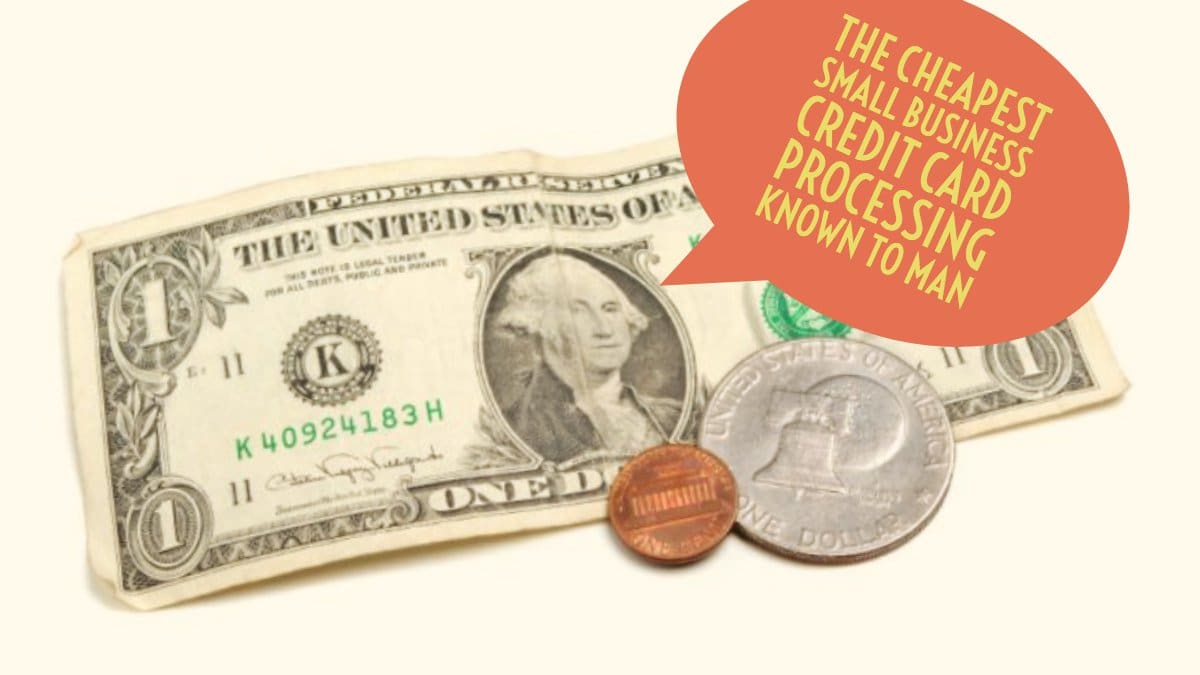
Have you asked yourself, what is the cheapest credit card processing for small business? If you have, you probably feel like you’ve been paying too much in processing fees, and you’re not alone.
In fact, almost every merchant that we talk with on the phone daily feels like they’re being ripped off. Whether it’s hidden fees or high percentage rates, when it comes to finding the cheapest small business credit card processing options, most business owners are drawing the short straw. We think that’s ridiculous, and we believe that honest processing should be available for everyone.
If you want your credit card processor to also engage in mobile credit card processing, find a processor that supports those platforms. Companies that support mobile processing should be able to accept both in-store payments and mobile payments.
Financial institutions like Bank of America push cards with the highest rewards because more people will sign up for them. However, they don’t pay the money back rewards. Instead, that burden falls on the business owner.
Table of Contents
ToggleFinding the Cheapest Small Business Credit Card Processing for Your Business

To find the cheapest small business credit card processing, you have to know what to look for. You need to know where companies are hiding the transaction fees that are taking your money. In this article, we give you 5 tips to help you receive the cheapest small business credit card processing available.
Also make sure your credit card processor is keeping your customer’s information safe. Credit card processors are forced to maintain PCI compliance, or else face additional fees.
#1- Lock in a Low Processing Rate
The first way to know if you have the cheapest small business credit card processing is if you have a locked in low processing rate. Getting a flat rate that’s locked in might seem hard with most processors for small businesses. They get really sketchy during discussions when you talk about rates. They say that the market changes and they have to be able to pass rising costs to you. That’s bologna.
You deserve a locked in rate for your business, and you can get it. You just have to find the right payment processor.
#2- No Annual Contracts
To get the cheapest small business credit card processing you need to not be locked into an annual contract. Most credit card companies for small business owners will lock you into a 3 or 4-year contract. Be sure to ask yourself why they’re making you sign a contract here. If they have to make you sign an annual contract, what are they hiding? Are businesses leaving them and they have to force you to stay around? This is just a bad sign, so no contracts for your business.
The honest processors will give you a month to month contract which you can terminate at any point without a cancelation fee or termination fee. The great ones will let you cancel your contract without an exit clause payment. Be on the lookout for that as well. You shouldn’t have to pay to leave your processor if they’re acting up.
Dual Payments also won’t hit you with any monthly minimums fees if you don’t hit a certain sales volume a month.
#3- Sign up for Cost-plus Pricing
To have the cheapest credit card processing for small business, you need to sign up for Cost-plus pricing. Cost-plus pricing, or interchangeplus pricing, is the most transparent and straightforward type of cheap credit card processing for small business. Most credit card companies will give you a percentage you’re paying for all card transactions. How do you know if that percentage is any good?
Any percentage you’re quoted is only as good as what that percentage actually means. For most credit card processors, the rate you’re being told applies to all cards equally. This may sound like a good thing, but it’s not.
For example. Let’s say you’re being quoted a rate of 1.57%. Sounds great, right? 99 times out of 100 that rate that you’re being quoted only applies to qualified cards. What is a qualified card?
A qualified credit card is basically a card with no rewards due to the customer. That’s no airline miles, cash back, hotel points or gas credits. So, how many “qualified” cards do you process? Not that many.
For every other card that’s not qualified, they’re charging you a different percentage. When it turns out that you’re processing only about 15% “qualified” cards, trouble ensues. You notice that you’re not getting 1.57% on your bill. It works out to closer to 4% when you do the math. How does that work?
When you process anything other than a “qualified” card, you’re getting a different rate. That is where card companies make their substantial markup. Most business owners don’t even bother to look, and they’re paying way more than they need to.
Cost-plus pricing means you’re paying fees that look like this:
- Whatever the credit card companies like Visa, American Express and Mastercard charge for each card. Doesn’t matter if they’re qualified, mid-qualified, non-qualified…You pay what Visa and Mastercard charge to be accepting credit card payments made on that card. No more no less.
- You add a very small fee that goes to the processing company. That small fee keeps them in business and you save a bundle.
#4- Work With a Free Credit Card Processing Company
For the cheapest small business credit card processing, you need to work with a credit card processing company that has totally free credit card processing. What is totally free processing? It’s just that. It’s free.
How can processing credit cards be free, right? There’s no merchant services company on the planet that will let your business accept credit and debit cards without a fee, right?
Probably not. Even credit card processing companies need to make money to keep their kids in piano lessons. What really great processing companies can do is help your customers pay your processing fees.
Dual Payments has a totally free, zero fee processing payment solutions that you should check out. With the zero fee credit card processing solution, the customer is made aware that there will be an additional fee to pay for this transaction with a credit card. It’s not on a sign on the counter or on a recorded voice over the smooth jazz ceiling system. It’s presented on the terminal at the point of sale.
Customers are informed that if they want to make the purchase with a credit card that there will be a convenience fee added to their sale. They decide if they want to pay with a credit card and if so, a minimal percentage is added to the sale. This small percentage takes card of the fees paid to the Card Issuers and the Payment Processing Company.
Your fees at the end of the month end up being $0.00
Companies that have their credit card payment processed for free will see a significant growth in their monthly revenue. For as long as you would stay with Dual Payments, there is no recurring bill due from you. Instead, we get our recurring payments through the fee from the customer.
If you currently pay $1,200 per month in credit card processing fees, next month = $0.00
If you currently pay $5,700 per month in credit card processing fees, next month = $0.00
Many small retail businesses choose to accept payments with Square payments. However, the fees associated with Square are quite high and can be a turn off for many businesses.
#5- Do Not Sign Up for Bundled Pricing
The last way to have a cheap credit and debit card processing option for small business is by not signing up for bundled pricing. If you are talking with a company that has anything called “bundled pricing” just walk away. This is a term that’s used to hide percentages and rates from the end business user. This is just a bad idea.
Take some time and discuss Cost-plus pricing with your merchant services provider. If they’re not willing to do Cost-plus pricing with your business, it’s time to find another provider like Dual Payments.
Other processors like Sams Club Merchant Services, Chase Merchant Solutions or Intuit Quickbooks Payments Services have more complicated pricing models. However, their main complaints tend to be their higher fees.
Cheapest Small Business Credit Card Processing: What is the Next Step?
To ensure the cheapest credit card processing for small business, ask us the hard questions above and we’ll tell you the same answers that were written here. No funny business, no high-pressure sales tactics. We offer low rates and great customer service with no strings attached.
Come and put us to the test. There’s no catch with Dual Payments. Our contracts are month to month, so if you try us and don’t like us, simply cancel and you’re done. There’s no risk to your business.
If you’re an online store or an online business that is looking for an online credit card processing company, shift can also help with that. We can provide a virtual terminal or payment gateway that is capable of processing online payment, still at zero fees to the business owner and help transport your company to an ecommerce business.
The POS software you get will be the one that you feel is right for your business. It will, at the bare minimum, contain credit card readers or a credit card machine that will allow you to process payments in-store through a physical card or mobile card like Apple Pay, depending on the payment systems that your business chooses.
Many POS systems come with additional features, however, like accounting software or shopping cart software.
We would love to earn your business by showing you how a company working to “Dual Payments” the national processing industry can act.










